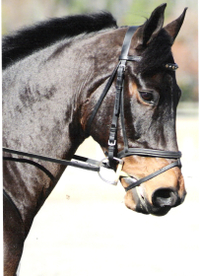Of Horses and Hearts

I live on a horse farm, so I see the interactions between horses and between horses and humans almost every day. Horses are extraordinarily sensitive creatures with their own sets of emotions and highly developed sense of propriety. They are also very good barometers for the emotional states of humans. We could not work out why one of the horses at another farm was consistently bratty with one particular rider, until we discovered that she was high on ecstasy. Her “energy” was a mess and it totally confused the horse.
On the other hand, horses are often used therapeutically with emotionally and mentally ill and handicapped children and adults. My old horse – Mr. Black – was a perfect therapy horse: nothing ever fazed him.
There is now some more research demonstrating one of the possible mechanisms by which horses may be able to pick up on a rider’s emotional states.
I have a couple of times mentioned some of the work being done at the Institute of HeartMath in California.
Some of their work is controversial, but most has been quite convincing.
I have for several years now been interested in the phenomenon of Heart Rate Variability (HRV). As the name implies, it is a measurement of the beat-to-beat variation in the heart’s rate. Alteration (primarily reductions) of HRV has been reported to be associated with various pathologic conditions like hypertension, hemorrhagic shock, and septic shock. It has found its role as a predictor of mortality after an acute myocardial infarction. It may also be disturbed in major depressive disorder.
I knew about it from the days that I worked at the National Heart Hospital in London, but Roger Callahan – the discover of Thought Field Therapy (TFT) – has been able to show that TFT is one of the few therapies that can normalize it. We also discussed it in the context of the vagal nerve and compassion.
From a pilot study by the Institute and Dr. Ellen Gehrke from Alliant University it appears that a horse’s heart rhythms reflect their emotional state and can respond to the emotional state of a nearby human. When in contact, a horse’s heart rate may mirror a human’s emotions, implying a close unspoken form of communication between the two.
The study took place at Dr. Gehrke’s ranch in San Diego, where electrocardiogram (ECG) recorders were placed on her and also on four of her horses. All five were monitored during a 24-hour period in which the horses were under a variety of normal conditions and activities such as eating, grooming or being alone. Measurements were also done while they were being ridden and accompanied by Dr. Gehrke.
The ECG recorders projected increased coherent HRV patterns for the horses during times of close, calm contact between them and Dr. Gehrke. Coherent HRV patterns have been shown to be the result of positive emotions and facilitate brain function.
Dr. Gehrke said, “Horses receive information from body language and give feedback. They don’t think very much, they feel. They are very emotional and honest. They also have a powerful impact on your sense of self and ability to lead.”
I don’t think that cardiac coherence is the whole story. They also respond to micro-movements – small movements of the legs, arms and trunk that are all but imperceptible to humans – and we have seen many of them sense events at long range. I travel a great deal and come home at odd times. But several witnesses saw Mr. Black start to become very excited 20-30 minutes before I would arrive home. In England, Rupert Sheldrake has amassed a considerable body of evidence to support those observations.
Nonetheless, this is very important research and I shall be very interested to see the final version once it has been subject to peer review.
“There is something about the outside of a horse that is good for the inside of a man.”
–Sir Winston Churchill (English Statesman, British Prime Minister, 1940-1945 and 1951-1955, and, in 1953, Winner of the Nobel Prize in Literature, 1874-1965)
“A man on a horse is spiritually as well as physically bigger than a man on foot.”
–John Steinbeck (American Writer and, in 1962, Winner of the Nobel Prize in Literature, 1902-1968)
“Wherever man has left his footprint in the long ascent from barbarism to civilization we will find the hoofprint of the horse beside it.”
–John Moore (American Man of Letters and Former Archivist and Librarian for the State of Tennessee, 1858-1929)
“I’d rather have a goddam horse. A horse is at least human, for God’s sake.”
–J.D. Salinger (American Writer, Student of Advaita Vedanta and Recluse, 1919-)
And finally:
“In my opinion, a horse is the animal to have. Eleven-hundred pounds of raw muscle, power, grace, and sweat between your legs – it’s something you just can’t get from a pet hamster!”
–Unknown Author







The American Institute of Stress and The Centers For Disease Control have both reported that up to 90% of all illnesses are due to stress. For many years I experienced several life threatening illnesses. I found the Institute of HeartMath and discovered that all of these illnesses were due to stresses I had been experiencing in my life. Learning and practicing HeartMath’s scientifically substantiated tools and technologies literally saved my life. Additional information on HeartMath and how to prevent, manage and reverse the effects of stress, in-the-moment, achieve better health, more energy, improved mental and emotional clarity, and improved performance and relationships can be found at http://www.emotionalmastery.com.
Thank you so much for writing.
I am sorry to have to disagree: that figure of “90% of all illnesses being due to stress,” cannot possibly be correct. There is good evidence that around 70% of illness is the result of lifestyle choices. The rest being primatily genetic and traumatic.
I am thrilled that the HeartMath tools helped you, and you have a great website!
Kind regards,
RP